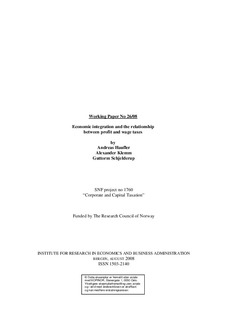| dc.contributor.author | Haufler, Andreas | |
| dc.contributor.author | Klemm, Alexander | |
| dc.contributor.author | Schjelderup, Guttorm | |
| dc.date.accessioned | 2009-06-10T08:42:04Z | |
| dc.date.available | 2009-06-10T08:42:04Z | |
| dc.date.issued | 2008-08 | |
| dc.identifier.issn | 1503-2140 | |
| dc.identifier.uri | http://hdl.handle.net/11250/166160 | |
| dc.description.abstract | This paper analyzes the development of the ratio of corporate taxes to wage taxes using a simple political economy model with workers and capitalists that own internationally mobile and immobile firms. Among other results, our model predicts that countries reduce their corporate tax rate, relative to the wage tax, when preferences for public goods increase, or when the share of capital employed in multinational firms is rising. We further show how an increase in the wage share changes both the relative size of tax bases and the political influence of different income groups. The predicted relationships are tested using panel data for 23 OECD countries for the period 1980 through 2004. The results of the empirical analysis support our main hypotheses. | en |
| dc.language.iso | eng | en |
| dc.publisher | SNF | en |
| dc.relation.ispartofseries | Working paper | en |
| dc.relation.ispartofseries | 2008:26 | en |
| dc.subject | capital and labor taxes | en |
| dc.subject | economic integration | en |
| dc.title | Economic integration and the relationship between profit and wage taxes | en |
| dc.type | Working paper | en |
| dc.subject.nsi | VDP::Samfunnsvitenskap: 200::Økonomi: 210::Samfunnsøkonomi: 212 | en |
